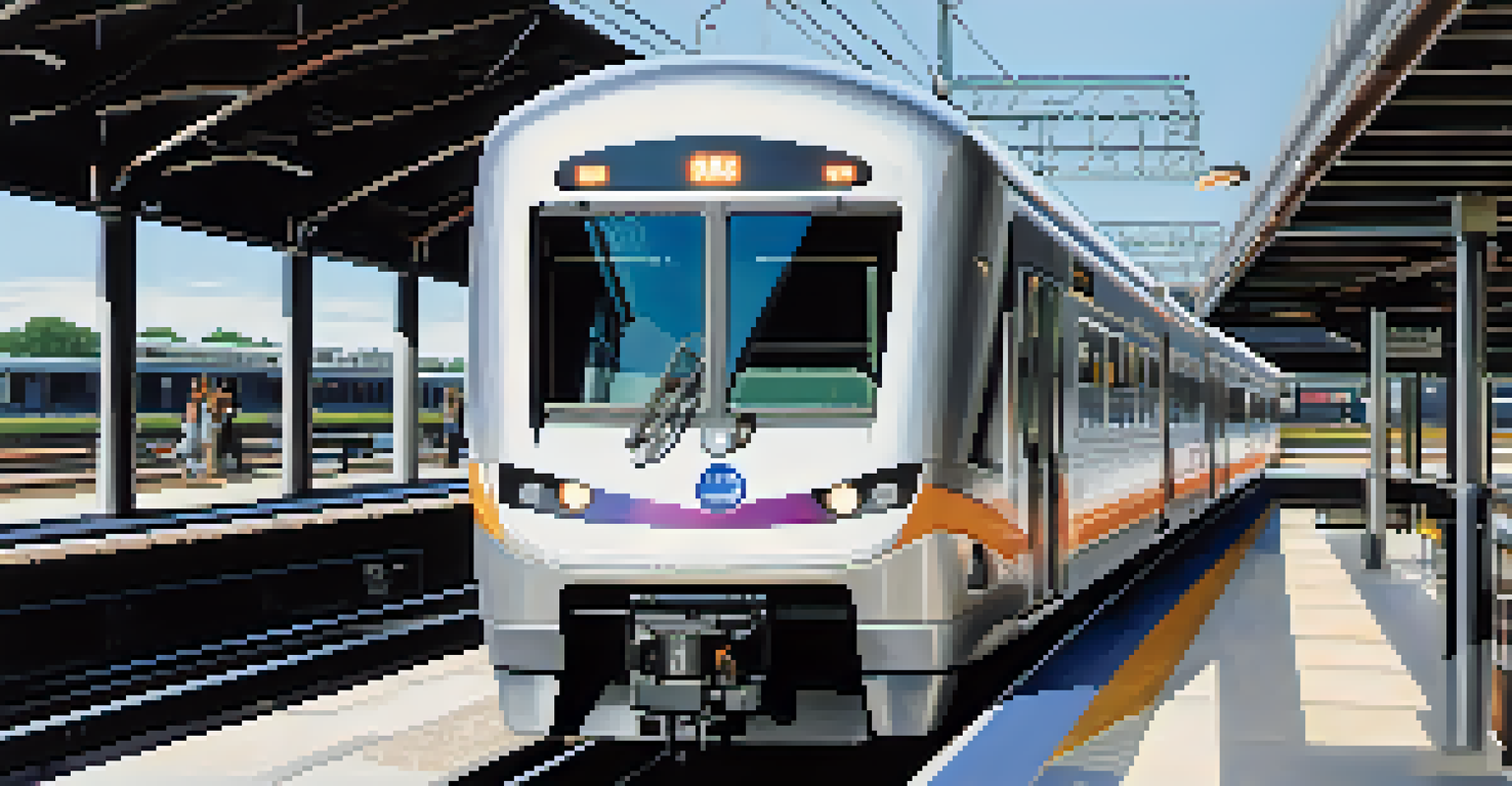The Role of NJ Transit in New Jersey's Transportation Network

Understanding NJ Transit: An Overview of Its Purpose
NJ Transit is the primary public transportation agency in New Jersey, connecting commuters to major cities and suburban areas. Established in 1979, its mission is to provide safe, reliable, and efficient transit options for residents and visitors alike. From trains to buses, NJ Transit plays a crucial role in reducing traffic congestion and supporting the state's economy.
Public transportation is a lifeline for our communities, providing essential access to jobs, education, and services.
By offering various modes of transport, NJ Transit ensures that everyone—from daily commuters to occasional travelers—has access to the transportation they need. This integrated approach allows for seamless transfers between different transport modes, making it easier for individuals to travel throughout the state. Whether you're heading to work or exploring New Jersey’s attractions, NJ Transit has you covered.
In essence, NJ Transit is not just a transportation service; it’s a vital lifeline that keeps New Jersey connected, enhances mobility, and promotes sustainability. As the state continues to grow, NJ Transit remains committed to adapting its services to meet the changing needs of its riders.
The Economic Impact of NJ Transit on New Jersey
NJ Transit is more than just a transportation agency; it significantly contributes to New Jersey's economy. By providing affordable and reliable transport, it encourages people to commute for work, education, and leisure, directly supporting local businesses. This influx of commuters helps stimulate economic growth and job creation across the state.

Furthermore, NJ Transit’s operations generate thousands of jobs, not only within the agency but also in related sectors such as tourism, hospitality, and retail. When people use NJ Transit to visit attractions or attend events, they contribute to the economic vitality of those areas. Thus, the agency acts as a catalyst for economic development throughout New Jersey.
NJ Transit Boosts NJ's Economy
By providing affordable and reliable transport, NJ Transit stimulates economic growth and job creation across the state.
In a broader context, NJ Transit helps reduce the reliance on personal vehicles, leading to less traffic congestion and lower carbon emissions. This not only benefits the environment but also improves the overall quality of life for residents—making it easier and more enjoyable to navigate the state.
NJ Transit’s Role in Reducing Traffic Congestion
One of the most pressing challenges in New Jersey is traffic congestion, particularly on highways and major roads. NJ Transit addresses this issue by providing an alternative to car travel, encouraging more people to use public transportation. By taking cars off the road, NJ Transit helps alleviate gridlock and makes commutes faster and more efficient for everyone.
Sustainable public transport is crucial for reducing traffic congestion and improving the overall quality of life in urban areas.
In cities like Newark and Jersey City, NJ Transit’s services are especially critical during peak hours when road traffic can be overwhelming. The agency’s extensive rail and bus networks allow commuters to bypass the stress of driving, offering a more comfortable and productive travel experience. Imagine being able to read a book or catch up on emails instead of sitting in traffic!
Moreover, by promoting public transit use, NJ Transit contributes to reduced greenhouse gas emissions, leading to a cleaner environment. This dual benefit of improved mobility and environmental sustainability showcases NJ Transit’s importance not just for individual riders, but for the community as a whole.
Enhancing Connectivity: NJ Transit’s Extensive Network
NJ Transit boasts an extensive network of train and bus routes that connect major cities, suburban areas, and even neighboring states. With over 1,000 miles of rail lines and nearly 2,000 bus routes, the agency covers a vast geographic area, making it easier for people to travel throughout New Jersey and beyond. This level of connectivity is essential for fostering a sense of community and accessibility.
The agency’s services connect riders not only to their workplaces but also to cultural and recreational destinations across the state. With stops at popular attractions like the Jersey Shore and state parks, NJ Transit makes it simple for residents and visitors to explore New Jersey’s diverse offerings. It’s not just about getting from point A to B; it’s about making the journey enjoyable and enriching.
Reducing Traffic Congestion
NJ Transit offers a viable alternative to car travel, helping to alleviate traffic and improve commuting efficiency.
Additionally, NJ Transit collaborates with other transportation agencies, further enhancing its service offerings. By integrating services with Amtrak and local transit systems, NJ Transit ensures that travelers have a smooth and cohesive experience, whether they’re commuting or exploring.
The Importance of Accessibility and Inclusivity in NJ Transit
Accessibility is a key focus for NJ Transit, ensuring that everyone, regardless of ability, can utilize its services. The agency has made significant strides in enhancing accessibility features on its trains and buses, including ramps, elevators, and designated seating areas. These efforts are crucial for individuals with disabilities, seniors, and families with strollers, allowing them to travel with ease.
Moreover, NJ Transit actively engages with the community to understand the needs of its diverse rider base. Through outreach programs and feedback initiatives, the agency incorporates suggestions and makes adjustments to better serve all its passengers. This commitment to inclusivity is vital for fostering a sense of belonging in New Jersey’s transportation landscape.
By prioritizing accessibility, NJ Transit not only complies with regulations but also enhances the overall travel experience for everyone. When transportation is inclusive, it empowers individuals to participate fully in their communities, ultimately enriching the social fabric of New Jersey.
Sustainability Initiatives: NJ Transit’s Green Commitment
Sustainability is at the forefront of NJ Transit’s operations, reflecting a growing commitment to environmental stewardship. The agency has implemented various initiatives aimed at reducing its carbon footprint, such as introducing energy-efficient trains and buses that run on cleaner fuels. This forward-thinking approach not only benefits the environment but also sets a standard for public transportation agencies nationwide.
Additionally, NJ Transit promotes the use of public transit as a sustainable alternative to driving. By encouraging more people to opt for trains and buses, the agency helps decrease traffic congestion and lower greenhouse gas emissions, contributing to a healthier planet. Each time a rider chooses NJ Transit over their car, they’re making a positive impact on the environment.
Commitment to Accessibility
NJ Transit prioritizes accessibility and inclusivity, ensuring that all individuals can utilize its services effectively.
Through ongoing investments in renewable energy and sustainable practices, NJ Transit is paving the way for a greener future. This commitment not only enhances public transit services but also resonates with environmentally conscious riders, reinforcing the agency's role as a responsible community partner.
Challenges Facing NJ Transit and Future Prospects
Like any transportation agency, NJ Transit faces its share of challenges. Aging infrastructure, funding constraints, and increasing ridership demand can strain resources and impact service reliability. Addressing these issues requires innovative solutions and collaborative efforts from state and federal partners to ensure that NJ Transit can continue to meet the needs of its riders.
The COVID-19 pandemic brought about unprecedented changes in commuting patterns, leading to a decline in ridership and revenue. However, as the state recovers, NJ Transit is adapting by re-evaluating its services, enhancing safety protocols, and exploring new technologies to improve the rider experience. This adaptability is crucial for maintaining relevance in a rapidly changing transportation landscape.

Looking ahead, NJ Transit is focused on modernization and expansion, with plans to invest in new technologies and infrastructure improvements. By prioritizing these developments, the agency aims to enhance efficiency, reliability, and overall service quality, ensuring that it remains an integral part of New Jersey's transportation network for years to come.